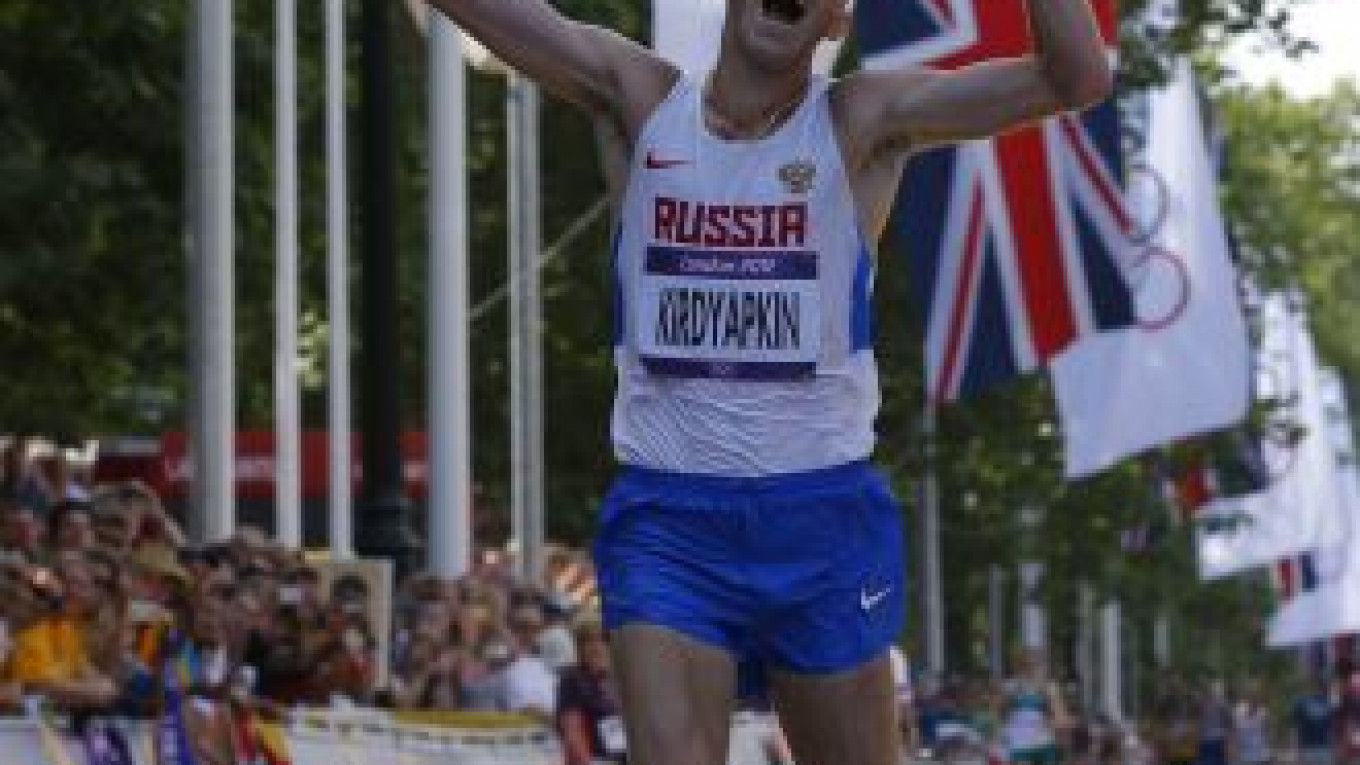LONDON — Sergei Kirdyapkin won the 50-kilometer walk, breaking the Olympic record by more than a minute and giving Russia its first gold medal in the event in 20 years.
Kirdyapkin finished Saturday's race 54 seconds ahead of Jared Tallent of Australia, who took silver. Si Tianfeng of China was 1 minute, 17 seconds behind to win bronze in the event along the streets of central London.
Kirdyapkin took a commanding lead at the 45-kilometer mark and crossed the finish line near Buckingham Palace in 3 hours, 35 minutes, 59 seconds.
He broke the Olympic record of 3:37:09 by 1 minute, 10 seconds. The mark was set by Alex Schwazer of Italy at the Beijing Games four years ago.
Schwazer had failed a doping test conducted by the World Anti-Doping Agency before arriving in London and was excluded from the Olympics.
The 27-year-old admitted to using the blood-boosting hormone EPO and was removed from the Italian team last Monday.
He said he felt immense pressure to defend his title in London.
Russia last won the 50K walk at the 1992 Barcelona Games. With Schwazer out, the Russian walkers were the favorites to claim the gold.
Kirdyapkin won the world championships in 2005 and 2009. He failed to finish at the 2008 Beijing Games.
"Compared with Beijing, today it all went perfectly well," Kirdyapkin said. "It's the Olympic gold medal, so for me it's the most important."
His wife, Anisya Kirdyapkina, competed in the 20K race later Saturday. She finished 1 minute, 25 seconds behind the winner, Russian teammate Yelena Lashmanova.
The 20-year-old Lashmanova improved on the year-old world mark by six seconds.
"It's the highest achievement for me to get an Olympic medal and break the record, but I did not expect it," she said.
Despite good preparations for the Olympics, she said she didn't feel up to the task in the lead-up to the event.
But she stepped up over the last 300 meters of the race to power past fellow Russian Olga Kaniskina and finish seven seconds ahead of the three-time world champion.
"She turned out to be stronger," Kaniskina said. "I was planning to go steadily fast, and I was doing very well, but at the end it was not good enough."
Both women are friends.
"We are very close on our team, so I hope it will be fine," Lashmanova said.
A Message from The Moscow Times:
Dear readers,
We are facing unprecedented challenges. Russia's Prosecutor General's Office has designated The Moscow Times as an "undesirable" organization, criminalizing our work and putting our staff at risk of prosecution. This follows our earlier unjust labeling as a "foreign agent."
These actions are direct attempts to silence independent journalism in Russia. The authorities claim our work "discredits the decisions of the Russian leadership." We see things differently: we strive to provide accurate, unbiased reporting on Russia.
We, the journalists of The Moscow Times, refuse to be silenced. But to continue our work, we need your help.
Your support, no matter how small, makes a world of difference. If you can, please support us monthly starting from just $2. It's quick to set up, and every contribution makes a significant impact.
By supporting The Moscow Times, you're defending open, independent journalism in the face of repression. Thank you for standing with us.
Remind me later.






